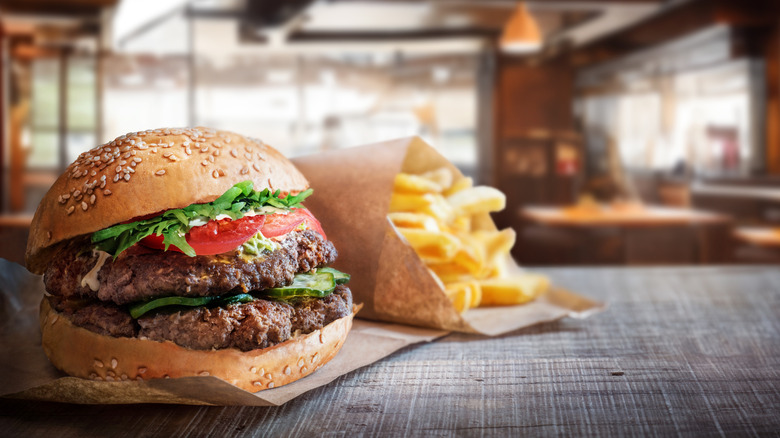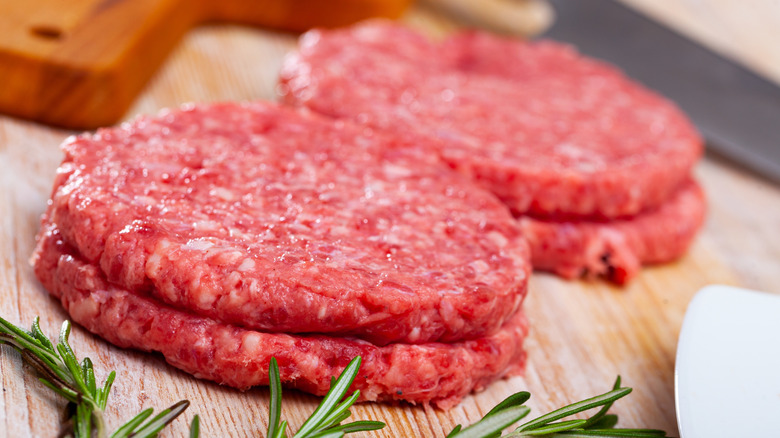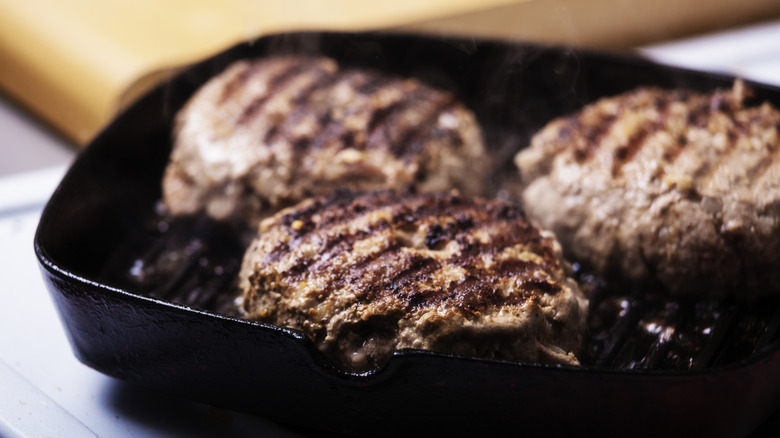Why Do Burgers From A Restaurant Taste So Much Better Than Homemade?
A hamburger is a relatively simple thing to cook, but we're always on a quest for the best restaurant burger. From the best high-end steakhouse chain burgers to greasy sacks of sliders (from none other than White Castle, America's quintessential fast food restaurant), we can't get enough. So why are restaurant burgers always so much better than the ones we make at home? Sam Shafer, executive chef of Sacramento's Revival at The Sawyer, lists several reasons why this might be the case.
Shafer, 2025 winner of the American River Burger Battle, tells The Takeout, "A restaurant burger's superior quality comes from a combination of expertly selected ingredients, careful preparation, and attention to detail at every stop." For one thing, a restaurant may be able to purchase better beef and might opt for a blend of different cuts like brisket, short rib, and sirloin. It might even work in a bit of dry-aged beef, which isn't something you can find in most supermarket meat departments. Shafer also points out, "Since restaurants cook far more burgers than home cooks, they usually do not overcook and have perfected the timing."
One thing about cooking your own burgers, though, is that they're bound to be a lot more affordable. If you're looking to save money by learning to make a better burger at home, Shafer says this goal is attainable. "There are a few common mistakes [people] make when prepping and cooking burgers," he explains. "By avoiding these common mistakes and using proper cooking techniques, you can improve your homemade burgers to achieve a restaurant-quality burger."
The shape of your burger can make a big difference
Improving the quality of your homemade burgers starts with the right meat. Choosing the best beef for a burger, not a steak, means prioritizing higher fat content. Sam Shafer says one way people mess up their burgers is by using too lean a cut. His advice? "Choose a ground beef with a higher fat content, such as 80/20 ground chuck."
Another burger-making mistake is over-seasoning the meat before you form the patties. For one thing, the burgers probably don't need it. According to Shafer, "Restaurants typically want the natural flavor of their burgers to shine, most often with the basic salt and fresh cracked black pepper on [the] top and bottom of their patties." Besides being superfluous, mixing seasonings into ground meat can compromise the texture of your burgers. As Shafer explains, "Seasoning, mixing and then forming patties can lead to tougher, chewier burgers because the salt can break down the protein from the inside out." It might also lead to overworking the meat. "Work the meat as little as possible when forming patties, only until the ingredients are just combined."
Cooking a restaurant-worthy burger
Cooking technique also counts when it comes to bettering your burger-making. Sam Shafer insists that you need to preheat your frying pan or grill before adding the patties, noting, "A hot cooking surface is essential for achieving a good sear and preventing the burger from sticking." Another big burger boo-boo is flattening the patties as they cook. "Pressing down on the burger with a spatula while it is cooking squeezes out the precious juices and flavor. Let the burgers cook undisturbed, flipping once or twice, but don't press out the juices," Shafer warns.
It's also important not to cook burgers to the point where they become dried out, losing all of their flavor. A nice sear or char on the outside is one thing, but incinerating a burger to the point where it turns black and crumbly is a sad waste of meat. Once the burgers come off the heat, don't plop them right on the buns and douse them with ketchup. Instead, allow them to sit for a few minutes. As Shafer recommends, "Allowing the cooked burgers time to rest a few minutes helps the juices redistribute, resulting in a juicer burger."


